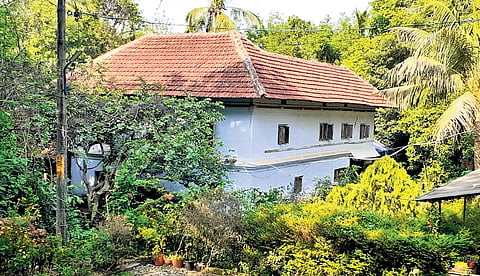

PALAKKAD: For authors Pushpa and Raghu Palat, this Vishu was unlike any other. As they stood in Amritsar, the city that witnessed one of the darkest chapters in India’s colonial history, the Jallianwala Bagh massacre of 1919, their phones buzzed with unexpected news: Prime Minister Narendra Modi had paid glowing tribute to Raghu’s great-grandfather, Sir Chettur Sankaran Nair, the towering civil rights crusader from Kerala whose fearless stand shook the very foundations of British rule.
“It felt like a Vishukkaineettam,” an emotional Raghu told TNIE over the phone.
“To receive this recognition from the highest level of government means the world to us.”
The work of Sankaran Nair has come into public consciousness in recent times on the strength of the Palat duo’s book ‘The Case That Shook The Empire’. And based on their book, a Hindi film -- Akshay Kumar-starrer Kesari Chapter 2 — is set to release on April 18.
The prime minister hailed Sankaran Nair while addressing a gathering in Haryana’s Yamuna Nagar on Monday.
He was born in the famous Chettur ‘tharavadu’ in Mankara, a village about 20km from Palakkad, and went on to become the only Indian member of the British Viceroy’s executive council.
“There was a man named Sankaran Nair, whose name many may not have heard,” PM Modi told the gathering.
“He was a prominent lawyer holding a high post in the British government. He could have enjoyed all the perks and luxuries, but he chose to give it all up. The people of Punjab, Haryana, and Himachal Pradesh should know about Sankaran Nair. Every adult and child should be aware of his contributions. We must remember him, he is an inspiration and a symbol of our patriotic spirit.”
Sankaran Nair made history when he resigned in protest after the 1919 Jallianwala Bagh massacre. At a time when challenging colonial power was often met with exile or execution, he chose to fight back with words and legal precision. His bold defamation suit against the British officials who denied the Punjab atrocities became a defining moment in India’s freedom struggle.
This remarkable chapter of history is now being retold on the silver screen in ‘Kesari Chapter 2’, directed by Karan Singh Tyagi. Adapted from the Palats’ meticulously researched book, the film pivots away from blood-stained battlefields to spotlight a quieter, but no less heroic, form of resistance -- the courtroom battle for truth and justice.
The film stars Akshay Kumar and R Madhavan. The Palats, who attended a special preview, were effusive in their praise: “The performances were outstanding. The courtroom scenes, especially, captured the gravity and emotion of the actual trial. We were moved,” Raghu said.
While the book explores the wider historical context and the harrowing details of the massacre, the film concentrates on the legal storm that followed, and how one man’s conscience sparked a fight that embarrassed the Empire on its own turf.
“We hope the film helps young people understand that freedom wasn’t just won on battlefields,” Pushpa said.
Though now settled in Mumbai, the Palats make an annual visit to their ancestral home in Palakkad -- a place steeped in memories of their great-grandfather’s fiery ideals. It was there, years ago, that the seed for their book was planted.
“We always felt Sir Nair’s story hadn’t been told the way it deserved. So, when the centenary of the Jallianwala Bagh massacre approached, we knew it was time,” Raghu said.
The book’s release in 2019 marked a scholarly reclamation of Sankaran Nair’s legacy. Now, with the film’s release, that legacy is reaching new, wider audiences. And for the Palats, it is a long-overdue homecoming for a national hero.
Who was Chettur Sankaran Nair?
● Born on July 11, 1857 at Mankara in Palakkad district to Parvathy Amma Chettur and Mammayil Ramunni Panicker. Chettur Sankaran Nair began practising law in the Madras HC in 1880 and was later appointed by the Madras government to the committee for an enquiry into the Malabar district in 1884
● In 1897, he presided over the First Provincial Conference held in Madras and was also elected as the president of the Indian National Congress, the first Keralite to become so, at its session in Amravati.
● In 1907, he was appointed as the advocate-general of the Madras Presidency. He served as the permanent judge of the Madras HC between 1908 and 1915, and was knighted by the British Crown for his services to the Empire in 1912.
● In 1915, he became a member for education in the Viceroy’s Council.
● He authored two powerful minutes of dissent in the dispatches on Indian Constitutional Reforms, criticising British rule and suggesting reforms in 1919, many of which were later accepted. In the same year, he resigned from the Viceroy’s Council in protest against the Jallianwala Bagh massacre and the imposition of martial law in Punjab.
● Between 1920 and 1921, he served in London as the councillor to the Secretary of State for India. In 1925, he became a member of the Indian Council of State. He died in 1934, at the age of 77.